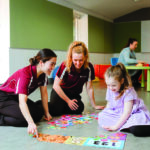If there’s one thing Australians love, it’s giving the English language a unique antipodean twist. Aussie slang – colloquialisms unique to Australia and its states – makes conversation colourful. However, it can also be confusing for international students.
Fortunately, we’ve put together a guide of some common words to help you build your confidence with Aussie slang.
Aussie slang: understanding the basics
In Australian slang, you’ll often see and hear people shortening words or adding ‘o’ and ‘ee’ sounds at the end of them, such as ‘rello’ for relative or ‘postie’ for a postal worker.
But the meanings of some Australian slang terms can come as a real surprise. Did you know that goodbye in Australian slang is ‘hooroo’ and toilet is ‘dunny’? Well, now you do!
The Aussie slang terms you need to know
General
Arvo: afternoon
“I’ll see you at the lecture tomorrow arvo.”
Bathers: swimsuit
“If we’re going to the beach, I need to pack my bathers.”
Chockers: full or crowded
“The bar was chockers when we arrived! We couldn’t find a seat.”
Full-on: intense or extreme
“Football training was full-on this week.”
Heaps: a large amount
“I did heaps of revision for this exam.”
No worries: it’s okay/no problem
“May I borrow a pen?”
“Yeah, no worries!”
Servo: a service station or petrol station
“We can buy some snacks from the servo.”
She’ll be right: it will be okay
“Don’t stress – she’ll be right!”
Shout: to pay for someone’s food or drink
“You bought my drink earlier, so this one is my shout.”
Food and drink
Avo: avocado
“Aussies love avo on toast.”
Barbie: barbecue
“Don’t forget Matt is hosting a barbie at his house this weekend.”
Bikkie: biscuit
“Let’s buy some bikkies for the picnic.”
Brekkie: breakfast
“Brekkie is the most important meal of the day.”
Chokkie: chocolate
“Would you like something sweet? We have some chokkie in the fridge.”
Cuppa: a cup of a hot drink
“Would you like a cuppa?”
Esky: ice cooler
“If you’d like to keep your drinks cold, you can put them in the esky.”
Sanga: sandwich
“I’ve packed a sanga for lunch.”
Emotions and states of being
Crook: sick or ill
“I won’t be in class today; I’m too crook.”
Devo: devastated
“I was devo when I missed the train.”
Stoked: very happy/excited
“I’m so stoked to go to the beach this weekend.”
Academia
D: distinction
HD: high distinction
P: pass
“Grades for this course range from P, to D, to HD.”
Workplace
Call it a day: to finish what you are doing
“Let’s log off and call it a day.”
Sickie: a day off work because of sickness
“I’m not feeling well. I think I need to have a sickie tomorrow.”
Squiz: to take a look or investigate
“Thanks so much for sending through that draft. I’ll take a squiz after my meeting.”

Get English language support at Curtin
There may be times when you need a little extra help in mastering Australian slang. Curtin is here to provide the support you need.
Curtin’s CHAtS (Help with speaking English) programs are here to provide further support with improving your English language skills. CHAtS uses fun, conversational activities to help you feel more confident with speaking in English, including the use of Australian slang.
The programs are available in person at Curtin’s Perth and Kalgoorlie campuses (CHAtS Perth and CHAtS Kalgoorlie), in partnership with Curtin English (CHAtS ELICOS) and in the Town of Victoria Park (CHAtS Town of Victoria Park). They are also available online via video calls.
Curtin English is another excellent resource for those looking to improve their proficiency in English. Offering three unique programs for students of varying abilities, Curtin English offers a clear pathway to Curtin degrees, allowing you to make your dreams of studying in Australia a reality – even if your English still has room for improvement.
Many students who speak English as a second language attend and enjoy the benefits of becoming more confident communicating in English. With help from CHAtS and/or Curtin English, you’ll feel confident ordering your sanga with extra avo and saying “She’ll be right” in no time!
Disclaimer
This post is correct as of 19 November 2025, but is subject to change by Curtin University (in its sole discretion). Curtin University may change the content, and its location or blog, post, and web address. This post contains general information only. Users should consider how it applies to their personal circumstances and seek specific advice. This blog, post, and our website are not intended as, and shall not be construed as legal, financial, tax, medical, health, or any other professional advice.
© Curtin University 2025.




